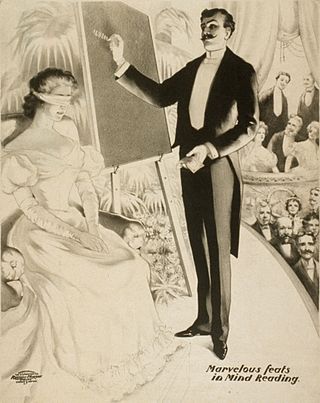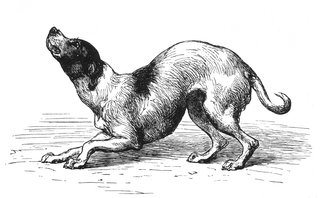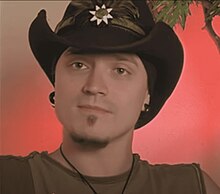Evolutionary psychology is a theoretical approach in psychology that examines cognition and behavior from a modern evolutionary perspective. It seeks to identify human psychological adaptations with regards to the ancestral problems they evolved to solve. In this framework, psychological traits and mechanisms are either functional products of natural and sexual selection or non-adaptive by-products of other adaptive traits.
Philosophy of psychology is concerned with the history and foundations of psychology. It deals with both epistemological and ontological issues and shares interests with other fields, including philosophy of mind and theoretical psychology. Philosophical and theoretical psychology are intimately tied and are therefore sometimes used interchangeably or used together. However, philosophy of psychology relies more on debates general to philosophy and on philosophical methods, whereas theoretical psychology draws on multiple areas.

Mentalism is a performing art in which its practitioners, known as mentalists, appear to demonstrate highly developed mental or intuitive abilities. Performances may appear to include hypnosis, telepathy, clairvoyance, divination, precognition, psychokinesis, mediumship, mind control, memory feats, deduction, and rapid mathematics. Mentalists perform a theatrical act that includes special effects that may appear to employ psychic or supernatural forces but that are actually achieved by "ordinary conjuring means", natural human abilities, and an in-depth understanding of key principles from human psychology or other behavioral sciences.
Pascal Robert Boyer is an American cognitive anthropologist and evolutionary psychologist of French origin, mostly known for his work in the cognitive science of religion. He taught at the University of Cambridge for eight years, before taking up the position of Henry Luce Professor of Individual and Collective Memory at Washington University in St. Louis, where he teaches classes on evolutionary psychology and anthropology. He was a Guggenheim Fellow and a visiting professor at the University of California, Santa Barbara and the University of Lyon, France. He studied philosophy and anthropology at University of Paris and Cambridge, with Jack Goody, working on memory constraints on the transmission of oral literature. Boyer is a Member of the American Academy of Arts and Sciences.

Religion Explained: The Evolutionary Origins of Religious Thought is a 2001 book by cognitive anthropologist Pascal Boyer, in which the author discusses the evolutionary psychology of religion and evolutionary origin of religions.
Michael Tomasello is an American developmental and comparative psychologist, as well as a linguist. He is professor of psychology at Duke University.
The cognitive revolution was an intellectual movement that began in the 1950s as an interdisciplinary study of the mind and its processes, from which emerged a new field known as cognitive science. The preexisting relevant fields were psychology, linguistics, computer science, anthropology, neuroscience, and philosophy. The approaches used were developed within the then-nascent fields of artificial intelligence, computer science, and neuroscience. In the 1960s, the Harvard Center for Cognitive Studies and the Center for Human Information Processing at the University of California, San Diego were influential in developing the academic study of cognitive science. By the early 1970s, the cognitive movement had surpassed behaviorism as a psychological paradigm. Furthermore, by the early 1980s the cognitive approach had become the dominant line of research inquiry across most branches in the field of psychology.

Geoffrey Franklin Miller is an American evolutionary psychologist, author, and associate professor of psychology at the University of New Mexico. He is known for his research on sexual selection in human evolution.
John Tooby was an American anthropologist who, together with his psychologist wife Leda Cosmides, pioneered the field of evolutionary psychology.
Evolutionary musicology is a subfield of biomusicology that grounds the cognitive mechanisms of music appreciation and music creation in evolutionary theory. It covers vocal communication in other animals, theories of the evolution of human music, and holocultural universals in musical ability and processing.
Pickup artists (PUA) are a movement of men whose goals are seduction and sexual success. They often self-identify as the seduction community or the pickup community. The community exists through various channels, including internet newsletters, blogs, marketing, forums, groups, and local clubs known as "lairs".

Anecdotal cognitivism is a method of research using anecdotal, and anthropomorphic evidence through the observation of animal behaviour.
The Pickup Artist is an American reality television dating themed game show that aired on VH1. The show was hosted by pickup artist Mystery and his wings J-Dog and James Matador, with Tara Ferguson replacing J-Dog in season 2. The first season featured eight male contestants that had previously been unsuccessful in love and relationships. Throughout the show the contestants are tutored in the art of the "pickup" as taught by Mystery and his wings. In each episode the men were given challenges that involved picking women up in different situations, such as on a bridge during the day or in a nightclub. As the show progressed the men were instructed to pick up women of varying levels of difficulty, such as in the second to last challenge of the first season where the men had to pick up a stripper, described by Mystery as "the ultimate challenge." The winner of the first season was Alvaro "Kosmo" Orlando.
Robert Kurzban is an American freelance writer and former psychology professor specializing in evolutionary psychology.
A cognitive module in cognitive psychology is a specialized tool or sub-unit that can be used by other parts to resolve cognitive tasks. It is used in theories of the modularity of mind and the closely related society of mind theory and was developed by Jerry Fodor. It became better known throughout cognitive psychology by means of his book, The Modularity of Mind (1983). The nine aspects he lists that make up a mental module are domain specificity, mandatory operation, limited central accessibility, fast processing, informational encapsulation, "shallow" outputs, fixed neural architecture, characteristic and specific breakdown patterns, and characteristic ontogenetic pace and sequencing. Not all of these are necessary for the unit to be considered a module, but they serve as general parameters.
Cognitive science of religion is the study of religious thought, theory, and behavior from the perspective of the cognitive and evolutionary sciences. Scholars in this field seek to explain how human minds acquire, generate, and transmit religious thoughts, practices, and schemas by means of ordinary cognitive capacities.
Douglas T. Kenrick is professor of psychology at Arizona State University. His research and writing integrate three scientific syntheses of the last few decades: evolutionary psychology, cognitive science, and dynamical systems theory. He is author of over 170 scientific articles, books, and book chapters, the majority applying evolutionary ideas to human cognition and behavior.

Mark van Vugt is a Dutch evolutionary psychologist who holds a professorship in evolutionary psychology and work and organizational psychology at the VU University Amsterdam, the Netherlands. Van Vugt has affiliate positions at the University of Oxford, Institute for Cognitive and Evolutionary Anthropology (ICEA).
The history of evolutionary psychology began with Charles Darwin, who said that humans have social instincts that evolved by natural selection. Darwin's work inspired later psychologists such as William James and Sigmund Freud but for most of the 20th century psychologists focused more on behaviorism and proximate explanations for human behavior. E. O. Wilson's landmark 1975 book, Sociobiology, synthesized recent theoretical advances in evolutionary theory to explain social behavior in animals, including humans. Jerome Barkow, Leda Cosmides and John Tooby popularized the term "evolutionary psychology" in their 1992 book The Adapted Mind: Evolutionary Psychology and The Generation of Culture. Like sociobiology before it, evolutionary psychology has been embroiled in controversy, but evolutionary psychologists see their field as gaining increased acceptance overall.
Negging is an act of emotional manipulation whereby a person makes a deliberate backhanded compliment or otherwise flirtatious remark to another person to undermine their confidence and attempt to engender in them a need for the manipulator's approval. The term was coined and prescribed by pickup artists.





